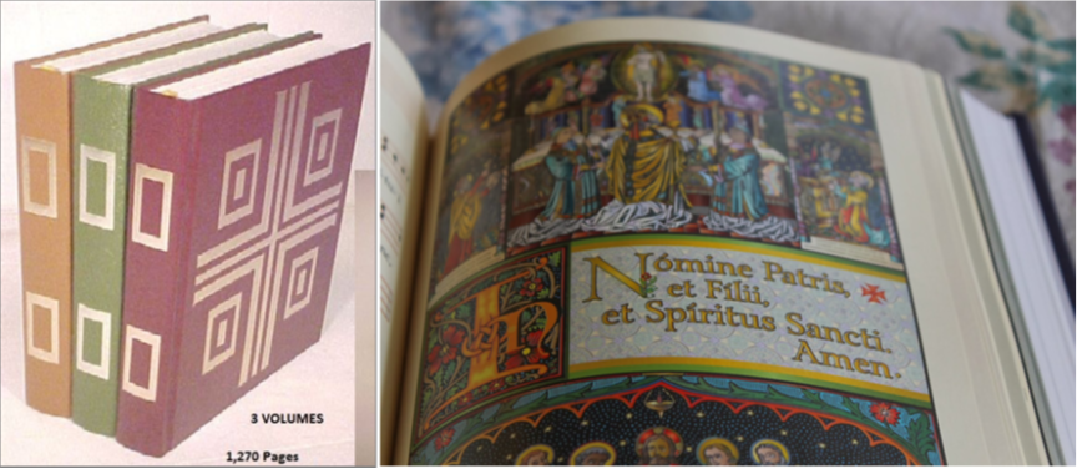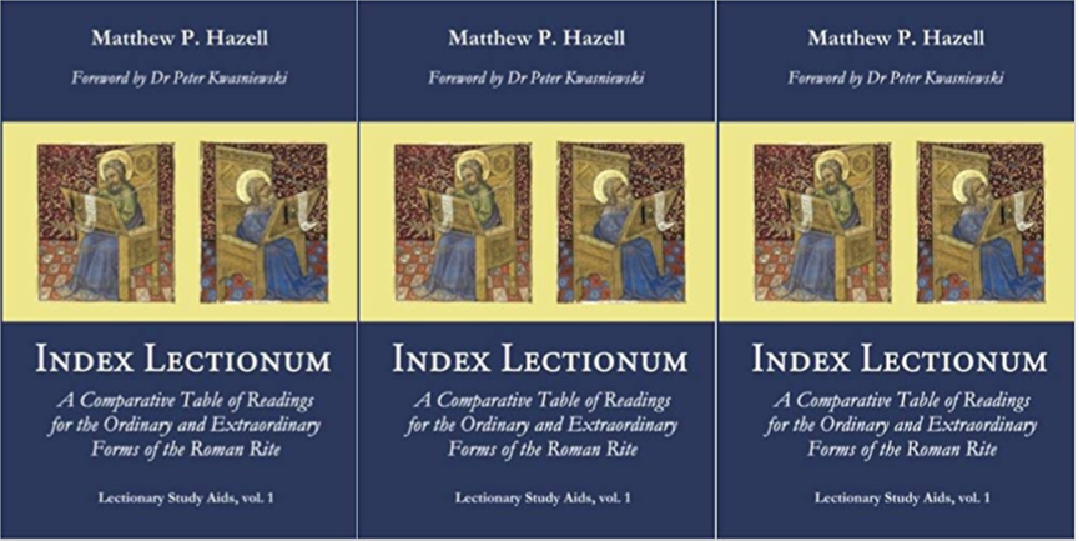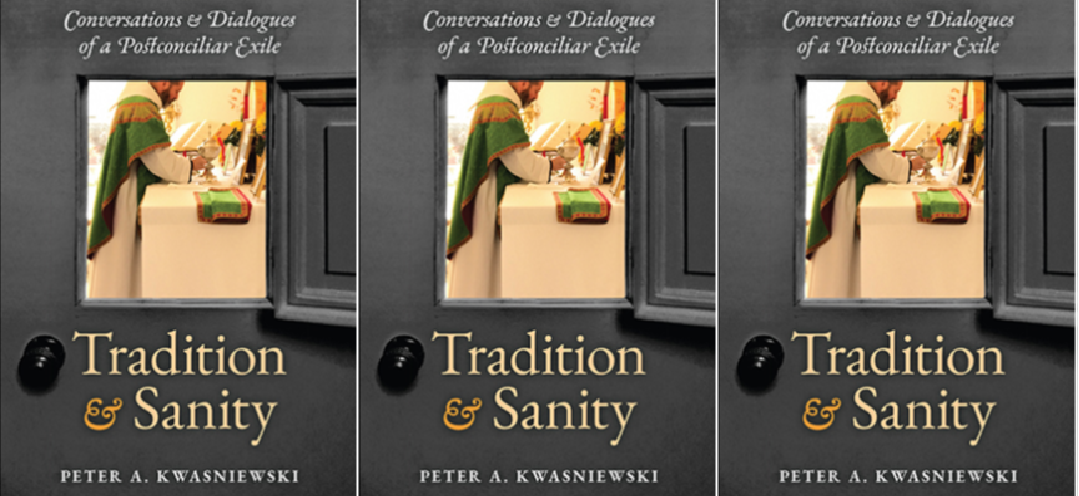 Left, the 3-year lectionary for the Novus Ordo; right, the Edmund Campion Missal which contains the unchanging annual lectionary of the Extraordinary Form.
Unless you are one of those Massgoers who recite the Mass prayers by rote without really thinking about what the priest - and you with him - are praying, the following lengthy
Left, the 3-year lectionary for the Novus Ordo; right, the Edmund Campion Missal which contains the unchanging annual lectionary of the Extraordinary Form.
Unless you are one of those Massgoers who recite the Mass prayers by rote without really thinking about what the priest - and you with him - are praying, the following lengthy
article by Peter Kwasniewski should interest you.
https://rorate-caeli.blogspot.com/2019/01/not-just-more-scripture-but-different.html#more
A CRITIQUE OF THE NOVUS ORDO LECTIONARY
by Peter Kwasniewski

January 11, 2016
Author's Note: The following study was completed in March 2016 and subsequently published as the Foreword to Matthew Hazell's remarkable reference work "Index Lectionum:
A Comparative Table of Readings for the Ordinary and Extraordinary Forms of the Roman Rite."
The passage of time under the reign of Pope Francis has meanwhile witnessed the welcome development of a large number of Catholics of good will beginning to wake up to the
magnitude of the rupture effected by the liturgical reform. Because not everyone has this volume or expects to have it, I've been encouraged to share the Foreword with
a wider audience. Nevertheless, I encourage serious students of liturgy to purchase the Index Lectionum itself, because it is a formidable research tool.
 Kwasniewski's major conclusion after comparing the 3-year lectionary cycle of the Novus Ordo to the unchanging annual lectionary of the Traditional Mass:
Kwasniewski's major conclusion after comparing the 3-year lectionary cycle of the Novus Ordo to the unchanging annual lectionary of the Traditional Mass:
There are a fair number of passages of the Word of God that used to be read every year or multiple times in a year that were marginalized in or excluded altogether from the new lectionary and are therefore rarely or never proclaimed in the modern Roman Rite.
In short, the new lectionary does not merely present more Scripture, but different Scripture — and that, not only in terms of material content but also in terms of the liturgical pedagogy by which the faithful are exposed with greater or lesser frequency to various inspired books and the images and doctrines they contain.
Add to this the fact that the readings of the usus antiquior are in almost every instance mandatory whereas many in the new lectionary are optional, and one can see how different the actual outcome will be...
It was not merely poor translation that left the Church without a way of public worship that adequately expressed her faith for the first decades of the Novus Ordo; it was also, and continues to be, the suppression or downplaying of major elements in the doctrine of Sacred Scripture that had been taught on a yearly basis for centuries, stretching back to the age of the Fathers....
Father Adrien Nocent, one of the experts for the revised lectionary, observed that it “is destined in the long run, but inevitably, to change the theological mentality and very spirituality of the Catholic people.”
But what if a lover of the Church’s liturgy, without denying the possibility of judicious development, does not wish to lose the “theological mentality and very spirituality of the Catholic people” as these have been transmitted to us through cherished ecclesiastical traditions?
It seems that our times are once again receptive to the counsel of the Prophet Jeremiah: “Thus saith the Lord: Stand ye on the ways, and see and ask for the old paths which is the good way, and walk ye in it: and you shall find refreshment for your souls” (Jer 6:16).
The present Index Lectionum is, above all else and before all else, a labor of love from a Catholic scholar who, in harmony with the best of the Liturgical Movement, is deeply committed to living the vita liturgica in its fullness and sharing it with others.
His work stands in service of that great nexus of mysteries about which the Second Vatican Council eloquently said: “Liturgia est culmen ad quod actio Ecclesiae tendit et simul fons unde omnis eius virtus emanat” — The liturgy is the apex to which the Church’s activity tends and, at the same time, the font whence all her power emanates.
Meanwhile, here is a review of Kwasniewski's new book:
 Reflecting on the EF Mass
Reflecting on the EF Mass
with tradition and sanity
Peter Kwasniewski’s most recent book is uplifting for those
who are fighting to revive the heart of traditional Catholicism.
by Amanda Ewinger

January 9, 2019
Those of us who love the Extraordinary Form of the Mass know what it feels like when heaven embraces earth in the liturgy - our spirits are hushed to an almost mystical serenity, and our souls are won over by the energy of divine grace.
- We know what it is like to tap into the resilience of the Latin Mass, savoring each moment, allowing ourselves to be carried away into the refreshing sanity of it all.
- We know what it means and we feel the power of the liturgy beating through the lifeblood of Mother Church. We get it.
- As Children of God and Children of the Light, we comprehend, we marvel and we hunger.
- We see Almighty God at work in magnificent ways through the Latin Mass, and
- We feel the urge to fight for its preservation and propagation with all of our being.
And yet, we struggle and struggle, and at times are simply overcome with discouragement and angst. We trudge through mud and we question the destiny of our efforts. Our love for the Extraordinary Form is so real, so raw, so burning and cutting into the very marrow of our bones – and yet, it is often misunderstood by so many, even some of the most devout members of Mother Church.
We believe in the transcendent Master of the Universe and an ethereal, unchangeable liturgy. We worship our King in union with an ageless Church, one that is victorious over the roaring winds of modernism and triumphant over the culture of death. As traditional Catholics, we do these things with zeal and conviction – and yet, so often, we do them alone and afraid.
Divine Providence, however, never leaves us without glistening hope on the horizon. Truly, He does not leave us orphans, but He comes to us. Along the way, He gives us what we need to accomplish His work on earth and bear fruit for the Kingdom of God.
One such help for us traditional Catholics trudging along the way is the work of Dr. Peter Kwasniewski, a founding member of Wyoming Catholic College, a prolific writer and speaker on Catholic Tradition, and a composer of sacred music.
His most recent book,
Tradition and Sanity, helps lift the spirits of us who are 'fighting the good fight' to revive the heart of traditional Catholicism. As Most Reverend Athanasius Schneider, Auxiliary Bishop of the Archdiocese of Saint Mary in Astana, Kazakstan, writes about the book:
Peter Kwasniewski offers a theologically sure and faith-filled view of the nature of the sacred liturgy and its practice while unmasking many deceitful novelties of the liturgical and pastoral life of the Church from the past 50 years. His work is a sign of hope. as proclaimed in the book: The Sun of Justice, the Teacher of Truth, the Word made Flesh has never ceased to shine in the darkness for those who heeded His light, His voice, His real presence.'
Tradition and Sanity gives encouragement and a good dose of sanity to traditionally-minded Catholics and truth-seekers who find themselves pelted by the seemingly unanswerable questions and daunting trials that “come with the territory.” In the words of Dr. Michael Sirilla, Director of the M.A. Theology program at the University of Steubenville:
In this brilliant constellation of interviews, essays, and dialogues, Dr. Kwasniewski graces us with his wit and breathtaking style. Yet those elements merely adorn, encase and support the gem of consuming love for Christ the King and the Church, His Bride. The sustained reading of this collection will bear fruits of encouragement and, above all, of renewed commitment to discovering and recovering the balms of our precious traditions.
The book includes a stash of inspirational gems and nuggets that one can glean from its wealth. For example, toward the beginning of the book, Kwasniewski gives a powerful testimony highlighting the dawning of his love for the Extraordinary Form:
I found that there was a very deep sense of the mystery of the Mass, of the reverence that we owe to it. And the seriousness of the liturgy was something that really impressed me.
Of course, we know that a Mass celebrated with the proper intention and the proper matter is a valid Mass, but in a lot of liturgies I had been to in my life, it seemed as if people weren't really serious about what they were doing.
And when I went to the old Mass, there was this total focus on God and on our Lord Jesus Christ. It was something that both attracted me and provoked me, because it made me wonder: If we really believe what we say we believe about the Mass and the Eucharist, why shouldn't we always be treating it with this massive adoration and reverence, this devotion, care and seriousness?
Tradition and Sanity also features compelling discussions about sacred music, such as an interview with Diane Montagna, the Rome correspondent for LifeSiteNews, in which she says:
In my experience as a teacher, young people have a hunger for traditional Catholicism and are excited when they discover sacred music... Yes, we are living in a difficult and chaotic period, but you can see shoots of green pushing up here and there through the gray volcanic rubble. It's enough to presage the regrowth of a lush forest. Our Lord never abandons His Church. He patiently calls us back to the 'beauty of holiness' when we have forsaken it.
Overall,
Tradition and Sanity is a light for us sojourners along the way, something to keep our eyes fixed on the ultimate goal of our labors – the high, majestic praise of Almighty God, King of Kings, and Lord of Lords.
[Modificato da TERESA BENEDETTA 12/01/2019 15:45]